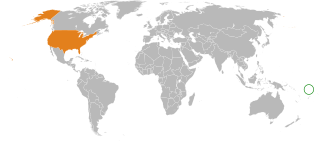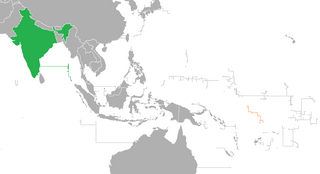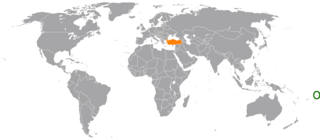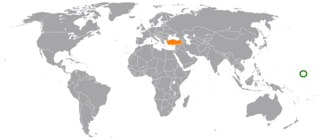
The government of the Federated States of Micronesia (FSM) conducts its own foreign relations. Since independence in 1986, the FSM has established diplomatic relations with a number of nations, including most of its Pacific neighbors.

Tuvalu is an island country in the Polynesian subregion of Oceania in the Pacific Ocean. Its islands are situated about midway between Hawaii and Australia. They lie east-northeast of the Santa Cruz Islands, northeast of Vanuatu, southeast of Nauru, south of Kiribati, west of Tokelau, northwest of Samoa and Wallis and Futuna, and north of Fiji. Tuvalu is composed of three reef islands and six atolls. They are spread out between the latitude of 5° and 10° south and between the longitude of 176° and 180°. They lie west of the International Date Line. Tuvalu has a population of 10,507. The total land area of the islands of Tuvalu is 26 square kilometres (10 sq mi).

Tuvaluan, often called Tuvalu, is a Polynesian language of or closely related to the Ellicean group spoken in Tuvalu. It is more or less distantly related to all other Polynesian languages, such as Hawaiian, Māori, Tahitian, Samoan, and Tongan, and most closely related to the languages spoken on the Polynesian Outliers in Micronesia and Northern and Central Melanesia. Tuvaluan has borrowed considerably from Samoan, the language of Christian missionaries in the late 19th and early 20th centuries.
This article is about the foreign relations of Tuvalu. From 1916 to 1975, Tuvalu was part of the Gilbert and Ellice Islands colony of the United Kingdom. A referendum was held in 1974 to determine whether the Gilbert Islands and Ellice Islands should each have their own administration. As a consequence of the referendum, the separate British colonies of Kiribati and Tuvalu were formed. Tuvalu became fully independent as a sovereign state within the Commonwealth on 1 October 1978. On 5 September 2000, Tuvalu became the 189th member of the United Nations.

Oceania is, to the People's Republic of China and the Republic of China, a stage for continuous diplomatic competition. The PRC dictates that no state can have diplomatic relations with both the PRC and the ROC. As of 2019, ten states in Oceania have diplomatic relations with the PRC, and four have diplomatic relations with the ROC. These numbers fluctuate as Pacific Island nations re-evaluate their foreign policies, and occasionally shift diplomatic recognition between Beijing and Taipei. The issue of which "Chinese" government to recognize has become a central theme in the elections of numerous Pacific Island nations, and has led to several votes of no-confidence.

Tuvalu – United States relations are bilateral relations between Tuvalu and the United States.
Cuban-Pacific relations are diplomatic, economic, cultural and other relations between the Republic of Cuba and countries situated in Oceania. In the 2000s, Cuba has been strengthening its relations with Pacific nations, which have, for the most part, responded favourably to Cuban medical aid in particular. The first Cuba-Pacific Islands ministerial meeting was held in September 2008 in Havana, with government members from ten Pacific countries—Kiribati, Tuvalu, Nauru, Solomon Islands, Fiji, Tonga, Vanuatu, Samoa, the Federated States of Micronesia and Papua New Guinea—attending. The meeting was a consolidation rather than a starting point of Cuban-Pacific relations.

Fiji–Tuvalu relations are diplomatic and other relations between Fiji and Tuvalu.

India–Tuvalu relations refers to the international relations that exist between India and Tuvalu. The High Commission of India in Suva, Fiji is concurrently accredited to Tuvalu. Tuvalu maintains an Honorary Consulate General in New Delhi.

India–Federated States of Micronesia relations refers to the international relations that exist between the Republic of India and the Federated States of Micronesia (FSM). The Embassy of India in Manila, Philippines is concurrently accredited to FSM.

The Turkish ambassador in Santo Domingo, Dominican Republic is also accredited to Antigua and Barbuda.

Guinea–Turkey relations are the foreign relations between Guinea and Turkey. Guinea opened its embassy in Ankara and Turkey opened its embassy in Conakry in 2013.

Mozambique–Turkey relations are the foreign relations between Mozambique and Turkey. Turkey has an embassy in Maputo since March 15, 2011 while Mozambique’s ambassador in Rome, Italy is also accredited to Turkey.

The Turkish ambassador in Canberra, Australia is also accredited to Vanuatu. Vanuatu has an honorary consulate in Istanbul.

Palau–Turkey relations are foreign relations between Palau and Turkey. The Turkish ambassador in Tokyo, Japan is also accredited to Palau.

Kiribati and Turkey have formal diplomatic relations. The Turkish ambassador in Canberra, Australia is also accredited to Kiribati.

Samoa–Turkey relations are foreign relations between Samoa and Turkey. The Turkish ambassador in Wellington, New Zealand is accredited to Samoa since April 12, 1979.

Marshall Islands–Turkey relations are foreign relations between the Marshall Islands and Turkey. The Turkish ambassador in Canberra, Australia is also accredited to the Marshall Islands. The Marshall Islands has an Honorary Consulate in Istanbul.

Nauru–Turkey relations are foreign relations between Nauru and Turkey. The Turkish ambassador in Canberra, Australia is also accredited to Nauru.
















